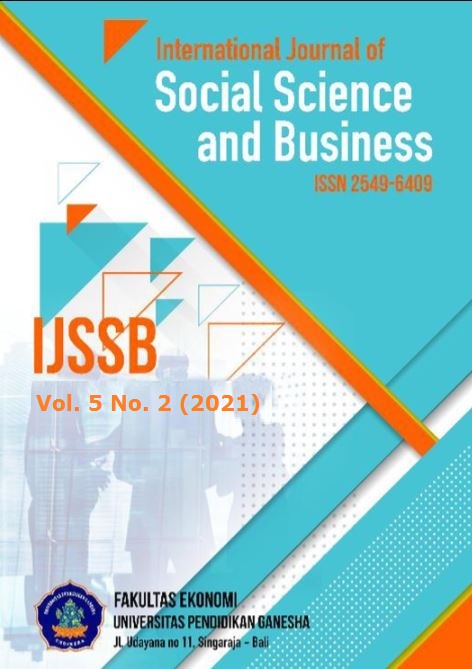The Role of Information Technology on Employee Performance in Universities at New Normal Life Order After Covid-19 Pandemic
DOI:
https://doi.org/10.23887/ijssb.v5i3.34584Keywords:
Teknologi informasi, kinerja karyawanAbstract
Social restrictions have become a serious problem with regard to employee performance. In order to maximize employee performance, it is necessary to use information technology in the new normal life. The purpose of this study was to determine the effect of the use of information technology (X) on employee performance (Y). The type of research used is explanatory research with a quantitative approach. The sample used in this study were 46 respondents. The data analysis used is descriptive analysis, inferential analysis, and multiple linear regression. The sampling technique used is a saturated sample. The results of this study can be concluded that the independent variables have a significant influence on employee performance simultaneously and partially. The use of IT because it has the largest beta coefficient and t count. From the results of multiple linear regression, it can be concluded that the independent variable has a significant influence on the dependent variable, employee performance, which is 64.7%. While the remaining 35.3% is another variable that can affect employee performance. Other variables that can affect employee performance include employee motivation and ability. Information Technology has had an influence on employee performance at universities in the new normal life order during the Covid-19 period.
References
Atho’illah, A. Y. (2018). Pengaruh Penerapan Teknologi Informasi Terhadap Kinerja Karyawan Di Koperasi Pondok Pesantren Mambaul Khoiriyatil Islamiyah (Mhi) Jember. OECONOMICUS Journal of Economics, 3(1), 01–20. https://doi.org/10.15642/oje.2018.3.1.1-20.
Firmansyah, Y., & Kardina, F. (2020). Pengaruh New Normal Ditengah Pandemi Covid-19 Terhadap Pengelolahan Sekolah Dan Peserta Didik. Jurnal Buana Ilmu, 4(2), 99–112. https://doi.org/10.36805/bi.v4i2.1107.
Hadiwardoyo, W. (2020). Kerugian Ekonomi Nasional Akibat Pandemi Covid-19. Baskara Journal of Business and Enterpreneurship, 2(2), 83–92. https://doi.org/10.24853/baskara.2.2.83-92.
Handayanto, R. T., & Herlawati, H. (2020). Efektifitas Pembatasan Sosial Berskala Besar (PSBB) di Kota Bekasi Dalam Mengatasi COVID-19 dengan Model Susceptible-Infected-Recovered (SIR). Jurnal Kajian Ilmiah, 20(2), 119–124. https://doi.org/10.31599/jki.v20i2.119.
Holid, A., & Meilani, R. I. (2018). Pengaruh lingkungan kerja sosial terhadap kinerja karyawan direktorat akademik di sebuah perguruan tinggi di Indonesia. Jurnal Pendidikan Manajemen Perkantoran, 3(1), 201–209. https://doi.org/10.17509/jpm.v3i1.9456.
Husaini, M. (2017). Pemanfaatan teknologi informasi dalam bidang pendidikan (e-education). Jurnal Manajemen Informatika, 2(1). https://ojs.ummetro.ac.id/index.php/mikrotik/article/view/314.
Inaray, J. C., Nelwan, O. S., & Lengkong, V. P. K. (2016). Pengaruh Kepemimpinan Dan Motivasi Kerja Terhadap Kinerja Karyawan Pada Pt. Amanah Finance Di Manado. Jurnal Berkala Ilmiah Efisiensi, 16(2), 459–470.
Krisnawijaya, N. K., & Dewi, I. G. A. A. P. (2019). Evaluasi Penerapan Undiknas Mobile: Analisis Technology Acceptance Model. SINTECH (Science and Information Technology) Journal, 2(2), 71–80. https://doi.org/10.31598/sintechjournal.v2i2.319.
Kurniawan, D. E., Saputra, A., & Prasetyawan, P. (2018). Perancangan Sistem Terintegrasi pada Aplikasi Siklus Akuntansi dengan Evaluasi Technology Acceptance Model (TAM). Jurnal RESTI (Rekayasa Sistem Dan Teknologi Informasi), 2(1), 315–321. https://doi.org/10.29207/resti.v2i1.271.
Kurniawati, H. A., Arif, A., & Winarno, W. A. (2017). Analisis minat penggunaan mobile banking dengan pendekatan Technology Acceptance Model (TAM) yang telah dimodifikasi. E-Journal Ekonomi Bisnis Dan Akuntansi, 4(1), 24–29. https://doi.org/10.19184/ejeba.v4i1.4563.
Lule, I., Omwansa, T. K., & Waema, T. M. (2012). Application of technology acceptance model (TAM) in m-banking adoption in Kenya. International Journal of Computing & ICT Research, 6(1). https://ijcir.mak.ac.ug/volume6-number1/article4.pdf.
Malhotra, N. K. (2004). Marketing Research: An Applied Orientation (4th ed.). Pearson Education Inc.
Muhyiddin, M. (2020). Covid-19, New Normal, dan Perencanaan Pembangunan di Indonesia. Jurnal Perencanaan Pembangunan: The Indonesian Journal of Development Planning, 4(2), 240–252. https://doi.org/10.36574/jpp.v4i2.118.
Mushlih, M., Segara, B., Hadie, D. A., Zakaria, R., & Aliviameita, A. (2020). Pendampingan Sekolah Dasar Negeri 4 Kupang, Jabon dalam Menghadapi New Normal. Humanism: Jurnal Pengabdian Masyarakat, 1(2). https://doi.org/10.30651/hm.v1i2.5565.
Muzakki, M. H., Susilo, H., & Yuniarto, S. R. (2016). Pengaruh Penggunaan Teknologi Informasi Terhadap Kinerja Karyawan (Studi Pada Karyawan PT. Telkom Pusat Divisi Regional V Surabaya). Jurnal Administrasi Bisnis, 39(2), 169–175. http://administrasibisnis.studentjournal.ub.ac.id/index.php/jab/article/view/1573.
Nustini, Y., & Adhinagari, A. H. (2020). Penerapan Technology Acceptance Model Pada Penggunaan E-Money Studi Pada Wilayah Non Perkotaan. Nominal: Barometer Riset Akuntansi Dan Manajemen, 9(2), 97–111. https://doi.org/10.21831/nominal.v9i2.30471.
Paramita, I. B. G., & Putra, I. G. G. P. A. (2020). New normal bagi pariwisata bali di masa pandemi covid 19. Pariwisata Budaya: Jurnal Ilmiah Agama Dan Budaya, 5(2), 57–65. https://doi.org/10.25078/pba.v5i2.1723.
Setiono, B. A. (2018). Pengaruh budaya organisasi, karakteristik individu, karakteristik pekerjaan terhadap kinerja karyawan PT. Pelindo III Surabaya. Jurnal Aplikasi Pelayaran Dan Kepelabuhanan, 6(2), 128–146. https://doi.org/10.30649/jurapk.v6i2.30.
Taufik, T., & Warsono, H. (2020). Birokrasi Baru Untuk New Normal: Tinjauan Model Perubahan Birokrasi Dalam Pelayanan Publik Di Era Covid-19. Dialogue: Jurnal Ilmu Administrasi Publik, 2(1), 1–18. https://doi.org/10.14710/dialogue.v2i1.8182.
Utami, S. S. (2012). Pengaruh Teknologi Informasi Dalam Perkembangan Bisnis. Jurnal Akuntansi Dan Sistem Teknologi Informasi, 8(1). http://ejurnal.unisri.ac.id/index.php/Akuntansi/article/view/155.
Widaningsih, R. A., Sukristanta, S., &, & Kasno, K. (2020). Tantangan Bagi Organisasi dalam Mempertahankan Kinerja Pegawai Selama Pandemi Covid-19 di Indonesia. Al Tijarah, 6(3), 193–198. http://ejournal.unida.gontor.ac.id/index.php/altijarah.
Wiratama, M. J., Darsono, N., & Putra, T. R. I. (2018). Pengaruh Teknologi Informasi dan Modal Intelektual Terhadap Efektivitas Komunikasi serta Implikasinya pada Kinerja Karyawan PT. Kurnia Purnama Jaya. Jurnal Manajemen Inovasi, 8(2). https://doi.org/10.24815/jmi.v8i2.9346.
Wirawan, K. E., Bagia, I. W., & Susila, G. P. A. J. (2019). Pengaruh tingkat pendidikan dan pengalaman kerja terhadap kinerja karyawan. Bisma: Jurnal Manajemen, 5(1), 60–67. https://doi.org/10.23887/bjm.v5i1.21991.











